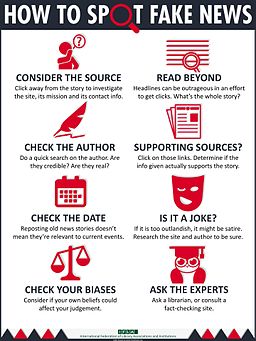Evaluating Online Resources
Take The Library’s Online Tutorial
More Resources To Check Your Facts & Bias
This list is not meant to be comprehensive. There are many places to check an article or outlet’s bias, facts, or sources, these are just a few of our favorites. Skeptical of fact checkers? A good bias rater or fact checking website will be transparent about their methodology and funding. If you’d like to dig a little deeper, try looking for the “About” “Methodology” “Mission” or “FAQ” sections of their website!
All Sides
https://www.allsides.com/unbiased-balanced-news
Focusing primarily on political news, All Sides seeks to reflect the news as it is covered from a breadth of perspectives. That includes different perspectives on the same story as well as different opinions on what the day’s top stories are. All Sides also seeks to provide context, revealing debate on the underlying issues and other helpful background. Includes information about how they determine bias, their editorial philosophy, and resources for checking your own biases.
Civic Online Reasoning
https://cor.stanford.edu/
Stanford’s free online curriculum to learn how to evaluate information. Includes lessons and assessments.
FactCheck.org
https://www.factcheck.org/
A nonpartisan, nonprofit, “consumer advocate” for voters that aims to reduce the level of deception and confusion in U.S. politics by monitoring the factual accuracy of what is said by major U.S. political players in the form of TV ads, debates, speeches, interviews and news releases.
Media Bias/Fact Check
https://mediabiasfactcheck.com
With more than 2200 media sources listed in their database media bias/fact check is one of the largest media bias resources on the internet. Search for news sources by name or web address (URL).
Media Wise Project
https://www.poynter.org/mediawise-education-resources/
Created by the Poynter Institute, this project aims to teach professional media literacy and fact-checking skills to the public. This link takes you to Media Wise’s educational resources page, which includes links and suggested resources, as well as online courses (note, some courses may require a fee).
Navigating Digital Information
https://www.youtube.com/playlist?list=PL8dPuuaLjXtN07XYqqWSKpPrtNDiCHTzU
This YouTube series teaches you the fact-checking skills that journalists must develop to do their jobs.
News Literacy Project
http://thenewsliteracyproject.org
Dedicated to giving students and adults the tools, tips, and resources they need to learn to tell fact from fiction.
Poynter Institute
https://www.poynter.org/channels/fact-checking
Poynter provides support and training to build journalist skills and integrity, including fact checking. They also host the International Fact Checking Network, which was launched in September 2015 to support a booming crop of fact-checking initiatives by promoting best practices and exchanges in this field, including a Code of Principles and a list of fact checking institutions.
Politifact
http://www.politifact.com/
Fact-checking journalism is the heart of PolitiFact. Their core principles are independence, transparency, fairness, thorough reporting and clear writing.
ProCon
https://www.procon.org/
ProCon.org is a 501(c)(3) nonprofit, nonpartisan, public charity, providing professionally-researched pro, con, and related information on more than 50 controversial issues from gun control and death penalty to illegal immigration and alternative energy. Their official mission statement is: “Promoting critical thinking, education, and informed citizenship by presenting controversial issues in a straightforward, nonpartisan, and primarily pro-con format.”
Snopes
https://www.snopes.com/
One of the oldest and largest fact checking websites, Snopes is also one of the most popular sources for fact checking. Snopes offers a wide scope of research, from urban legends to fake news.
Teen Fact Checking Network
https://www.poynter.org/teen-fact-checking-network/
Hosted by Poynter’s Media Wise project, this fact-checking site is run by teen fact-checkers and intended for teen audiences.
Featured Online Resources
Environmental Studies
![]() Gale In Context: Environmental Studies provides comprehensive information via case studies, news, reference materials, academic journals, and videos so learners can critically analyze and understand important environmental issues that affect people around the world. Explore topics including water privatization, ecotourism, pollution, green economy, and more.
Gale In Context: Environmental Studies provides comprehensive information via case studies, news, reference materials, academic journals, and videos so learners can critically analyze and understand important environmental issues that affect people around the world. Explore topics including water privatization, ecotourism, pollution, green economy, and more.
Global Issues in Context
Integrates news, global viewpoints, reference materials, country information, primary source documents, videos, statistics, and more in a single search with a global perspective.
InfoTrac Newsstand
Full-text newspaper article search by title, headline, date, author, newspaper section, or other fields, to more than 2,300 major U.S. regional, national, and local newspapers, as well as leading titles from around the world
InfoTrac Student Edition
Periodicals database is designed for high-school students with access to a variety of indexed and full-text magazines, newspapers and reference books.
Massachusetts Municipal Guide
A statewide listing of municipalities by county, state and regional contact information for a variety of government departments and services for the Commonwealth of Massachusetts. Includes addresses and contacts for elected and appointed officials from the local level to the U.S. Congress.
Niche Academy: Online Learning
 Tutorials created by staff in Chelmsford and libraries across the country, focusing on educational topics across a variety of subjects: business, finance, evaluating online information, health, research skills, and more. Click into any tutorial for a step-by-step guide, with text, graphic, and video instructions. We also take suggestions for new tutorials!
Tutorials created by staff in Chelmsford and libraries across the country, focusing on educational topics across a variety of subjects: business, finance, evaluating online information, health, research skills, and more. Click into any tutorial for a step-by-step guide, with text, graphic, and video instructions. We also take suggestions for new tutorials!
Opposing Viewpoints (Gale In Context)
Provides coverage of topics in today’s news from multiple points of view, to help researchers evaluate topics from different angles. Find information in reference articles, infographics, news, images, video, audio, and more.






